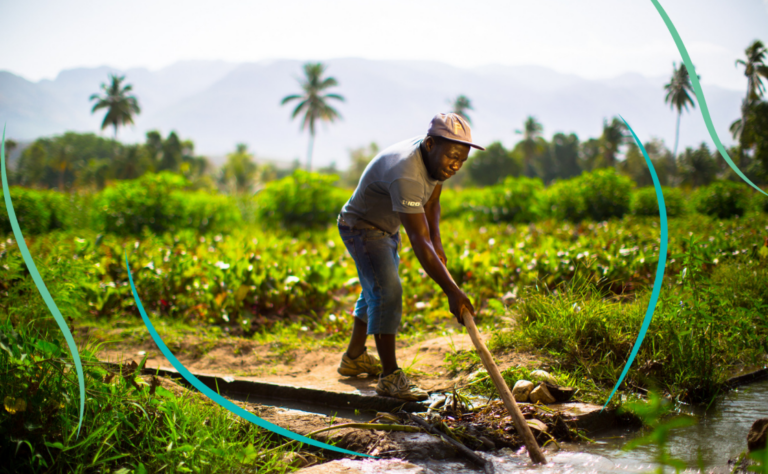The convergence of agriculture and progressive thought often elucidates transformative societal movements. In Haiti, a nation burdened by historical adversity, a cadre of farmers has emerged as pioneers, espousing Baha’i teachings to effectuate revolutionary change. This narrative not only embraces agricultural innovation but also engages deeply with the philosophical underpinnings that inspire these actions, promising a significant shift in perspective towards the interconnectedness of global communities.
To commence a thorough exploration of this paradigm, it is imperative to delineate the fundamental tenets of Baha’i teachings. At the core is the principle of unity—unity of humanity, of purpose, and of action. Baha’is assert that the spiritual and material progress of humanity are intricately linked. This principle serves as a beacon for farmers in Haiti, who visualize agricultural practices not merely as a means of livelihood but as an avenue for the holistic development of their communities. The notion that food production is not solely an economic endeavor but a communal responsibility declares a commitment to greater societal well-being.
Haitian farmers exemplify the realization of these ideals through their innovative approaches to agriculture. They adopt sustainable practices that honor the land, leveraging techniques such as agroecology. This method emphasizes biodiversity and resilience, employing natural systems to cultivate crops and livestock while minimizing ecological impact. This model resonates deeply with Baha’i teachings that advocate for the stewardship of the Earth. Empowering farmers to care for their environment aligns with the Baha’i belief that humanity has a moral obligation to protect the planet for future generations.
Furthermore, in adopting a collaborative approach, these farmers create networks founded on mutual support and shared knowledge, thereby embodying the Baha’i principle of consultation. This element of communal decision-making encourages diverse perspectives, fostering inclusivity and bolstering the collective spirit. Such environments nurture creativity and innovation, whereby farmers collectively tackle challenges posed by climate change and food insecurity. The act of utilizing local resources and knowledge not only promotes sustainability but also fortifies community bonds, thus transforming isolated agricultural endeavors into a cohesive movement.
Integration of education in agricultural practices is another quintessential aspect of this transformation. Farmers in Haiti actively engage in educational initiatives, disseminating knowledge about sustainable practices and the importance of adhering to ethical standards. The Baha’i principle emphasizing the significance of education resonates profoundly within this context. By cultivating both academic and practical knowledge, farmers inspire future generations and lift communities from cycles of poverty. Education becomes a conduit for liberation as it empowers individuals not merely to survive but to thrive.
Moreover, these endeavors have far-reaching implications beyond the realms of agriculture and economics. They represent a burgeoning awakening to the social and spiritual dimensions of existence. By incorporating Baha’i teachings of racial harmony and equality, Haitian farmers challenge entrenched societal structures that perpetuate inequity. Their efforts cultivate an environment where inclusivity is paramount, thereby dismantling divisions fostered by historical legacies. This emergent consciousness has the potential to shift societal paradigms, encouraging broader societal engagement through the lens of unity.
A crucial element of this transformation is the recognition that each farmer’s individual success amplifies the collective advancement. The shared ethos is articulated through pragmatic initiatives such as cooperatives, which allow farmers to pool resources, share profits, and mitigate risks. This model embodies the Baha’i principle of collaboration and interdependence, showcasing how individual contributions converge towards a common good. Such frameworks empower marginalized communities and underscore the importance of economic equity within the larger societal context.
While this approach is laudable, it does not come without challenges. The Haitian landscape remains fraught with obstacles, including economic instability, political tumult, and natural disasters. However, the resilience exhibited by farmers who adhere to Baha’i principles transforms adversity into opportunity. Their ability to innovate under duress encapsulates the tenacity of the human spirit. Moreover, the integration of communal solidarity within these frameworks enables farmers to withstand challenges collectively, advocating for systemic change in policies affecting rural development.
In understanding the transformative potential of this narrative, it becomes evident that the intersection of Baha’i teachings and agricultural practices is profound. The implications traverse beyond mere food production; they incite a philosophical awakening that encompasses social justice, environmental sustainability, and collective action. The revolutionary changes spearheaded by Haitian farmers beckon a re-examination of conventional metrics of success. Success can no longer be confined to economic growth alone; it must encompass the welfare of the community and the safeguarding of the environment.
Ultimately, the story of these farmers epitomizes a forward-thinking approach that is ripe with potential. It calls upon global communities to reconsider their own value systems and challenges them to embrace unity in diversity. By shadowing the progress made through the lens of Baha’i ideals, advocates for change worldwide are encouraged to cultivate similar seeds of transformation within their contexts. It is an invitation to actively participate in a global dialogue on equity, sustainability, and collective progress.
Additionally, the work of these farmers is a testament to the potency of localized action. As global citizens, there is a need to foster curiosity and support local initiatives that align with Baha’i principles. The efforts of Haitian farmers illuminate an inspiring path forward, signifying the potential for agricultural practices to become a catalyst for profound societal change, that reverberates throughout the annals of human history.
